Arts & Culture

While much will hinge on the motives of a white gunman attacking a mostly-white country music crowd, that uncomfortable question also hits at some of America’s most divisive issues: race, religion, and politics.

All eyes should be on Justice Anthony Kennedy. At 81, Kennedy is the longest-serving, second oldest justice on the court and is a conservative — except when he’s not.
Kennedy has sided with the court’s more liberal justices on several landmark cases, as he did in Obergefell v. Hodges, the 2015 decision that made same-sex marriage the law of the land. But he also sided with the conservative judges in Burwell v. Hobby Lobby, a ruling that the Christian-owned chain of craft stores could deny contraception coverage.

The attack at a country music festival in Las Vegas that left at least 58 people dead is the deadliest mass shooting in modern US history – but there were six other mass shootings in America this past week alone.

“My heart goes out to all those impacted by this senseless act of violence. When tragedies like the Las Vegas massacre occur, the political and religious barriers that too often divide us break down and we come together to mourn as Americans. This moment presents all of us with the opportunity to be there for one another as we try to come to terms with what happened yesterday. As our nation mourns, I hope we continue in the spirit of inclusion, as we are all impacted by this terrible tragedy.”

We pray for others far away
Who’ve seen destruction, too;
We look beyond ourselves, for they
Are also loved by you.

As recently as 2013, dozens of women uploaded videos online of themselves behind the wheel of a car during a campaign launched by Saudi rights activists. Some videos showed families and male drivers giving women a “thumbs-ups,” suggesting many were ready for the change.
While women in other Muslim countries drove freely, the kingdom’s blanket ban attracted negative publicity. Neither Islamic law nor Saudi traffic law explicitly prohibited women from driving, but they were not issued licenses and were detained if they attempted to drive.

Grace works that way. People come into our lives unexpectedly and show us things we need to see. Those people and those moments become edge pieces for us, if we let them. It’s good to remind ourselves of that now, when we’re so divided and disconnected that we can’t even see the picture we’re meant to form together. We’ve forgotten that each of us is a piece of something bigger than ourselves.
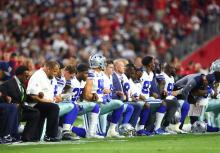
Trump’s mythical narrative is a lie because he’s wrong about the motivations of the NFL players who kneel during the national anthem. They don’t kneel because they hate the flag. They aren’t monsters threatening the United States. They kneel because they love the flag and the ideals for which it stands.

mother!'s grotesquely literal take on the Eucharist also fundamentally misses what communion means.

What is Star Wars? For the first decade or so after George Lucas made what would come to be known as Episode IV, which celebrates its 40th anniversary this year, the answer to that question was easy: Star Wars was whatever Lucas said it was.
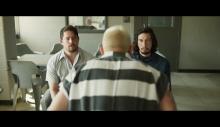
LOGAN LUCKY, the new film from Steven Soderbergh, is a delicious surprise. It’s about working-class Southerners robbing the Charlotte Motor Speedway during a NASCAR race, and its weaving of the intricacies of planning, executing, and living in the post-heist glow is hilarious and even warm.
More than that, it’s a heist film in which ordinary people (not slick, hypermasculine Armani warriors) employ imagination instead of heavy artillery to take money from an institution that doesn’t need it anyway. The fact that the target of the theft got the money through selling overpriced, undernourishing food and drink is only one piece of bonus philosophical content. It’s a rare thing: a thoroughly entertaining movie with real things to say about the moment it is released. At a time when left-right political division in the U.S. has intensified, Soderbergh, a Southerner who works from New York, has made a red-blue reconciliation comedy.
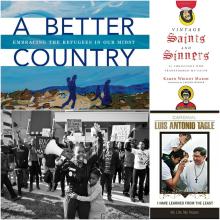
Our Streets
Filmmakers Sabaah Folayan and Damon Davis use their backgrounds as activists and artists to create Whose Streets?, a gripping documentary about the Ferguson uprising. Through scenes of hope and resistance, Whose Streets? reclaims Mike Brown’s story and shows Ferguson through the eyes of those who experienced it. whosestreetsfilm.com

A way of binding books that will prevent
breaking of backs.

Who can forget Harold Camping, the Christian radio media mogul who picked two dates in 2011, hit the airwaves, put up billboards, solicited money — and nada. He joined some rather famous names — Edgar Cayce, Sun Myung Moon, Jerry Falwell, and Pat Robertson [at least twice, but before he had access to the White House], and John Hagee among them — of failed futurists. Heck, Sir Isaac Newton himself, great astronomer and mathematician, bet that Jesus would return in the year 2000.

DuPage County Judge Joseph Bugos signed arrest warrants and set $50,000 bonds against the players — James Cooksey, Kyler Kregel, Benjamin Pettway, Noah Spielman and Samuel TeBos — late Monday afternoon. Prosecutors charged the athletes with aggravated battery, mob action, and unlawful restraint.

Faith communities can play a powerful role in preventing violence and supporting survivors, but collectively we’re falling short. Two-thirds (65 percent) of pastors say they speak once a year or less about sexual and domestic violence, with 1 in 10 never addressing it at all. This failure has a deep and lasting impact.

APOCALYPSE IS in the air. Perhaps it was the eclipse in August, or the always accelerating churn of foreign and domestic scandal in the news, or the looming threat of climate change. Or perhaps people have always lived this way. But the world feels weighty and close to falling apart, and we start wondering how we would handle the aftermath.
When the English Fall, by David Williams (no relation), examines that possibility: a post-apocalyptic novel about a catastrophe that makes the low-tech, community-minded lifestyle of the Amish the only viable one. We witness the immediate aftermath of the modern life of the English (the Amish name for all non-Amish people) failing due to a solar storm; society is placed under immense stress without the ability to feed itself. In a fantastic choice, this is examined through the life of an Amish farmer named Jacob—how he adapts and the difficult decisions that he must make for his way of life to survive.

WITHIN THE FIRST pages of The Far Away Brothers: Two Young Migrants and the Making of an American Life , it becomes clear that Lauren Markham understands the complexities of immigration to the United States and has personally worked with immigrants stuck in its tangled web. In a journalistic style, she reports the story of teenage twin brothers Raúl and Ernesto, fleeing gang violence in El Salvador, hoping to find safety and new opportunities in El Norte.
Markham has worked in refugee resettlement and immigrant education for the past decade. In this book she covers all aspects of immigration in well-researched detail. But she also seems to understand that while any reader could argue immigration policy, no one can argue with the Flores brothers’ story, from the crippling poverty in rural El Salvador, where life is cheap and disposable, to the stark loneliness of their lives in the U.S., far from the comforts of family and home.
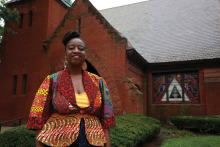
WALTRINA MIDDLETON'S VOICE lifts you to the highest highs with bellows of crisp spoken word. Seamlessly, her croons can plunge you down the rhythm of any blues-laced freedom song. Your heart is gripped with deep, rolling riffs of truth spoken.
Harnessing the power of pain is just one of her many spiritual gifts. Middleton is an ordained minister, activist, and artist with roots in the Gullah Geechee community in South Carolina. A self-professed country girl, she grew up in Hollywood, S.C., on the coastal Gullah Sea Island of Yonges, about 30 minutes outside of Charleston.
“It was beautiful—a swampland with dirt roads, farm, and fields,” she told Sojourners. “I made my grandparents’ hogs my pets before I realized they were actually dinner.”
It’s been a winding road on the path to self-discovery for Middleton, but she says music was there from the very beginning. “Music was central to our family,” she said. “It was an intergenerational medium that brought us together, but also rooted us in our faith.”
Her grandparents had 16 children, and all of them could sing or play an instrument. The family put together a group called the Middleton Gospel Singers that toured the local church community. “Part of the country circuit is to have some kind of gospel group,” she said. “The women in my family were the instrumentalists. I was always with my family when we would be in church all day going to these programs. The whole point was to worship God. It was just something that you did.”
Even when there wasn’t a church function or performance, Middleton says music was a part of her everyday life. “We had this big ol’ barn, and we would be in the barn sitting, rehearsing, and practicing,” she said. “Sometimes there would be a fire; sometimes people would just come, listen, and talk. While they were rehearsing, we would sit out there and eat crab.”
At these family gatherings, her artistic flair began to take shape. She admired her older cousins and says they heavily influenced her style. “They had this depth to them that I couldn’t describe,” she said. “It was very low and lamenting. I found myself trying to imitate their style. It also taught me that worship could also be lamenting.”
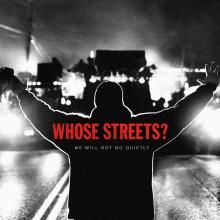
As filmmaking, Whose Streets is dramatic and powerful. As a historical document, it holds even more weight.